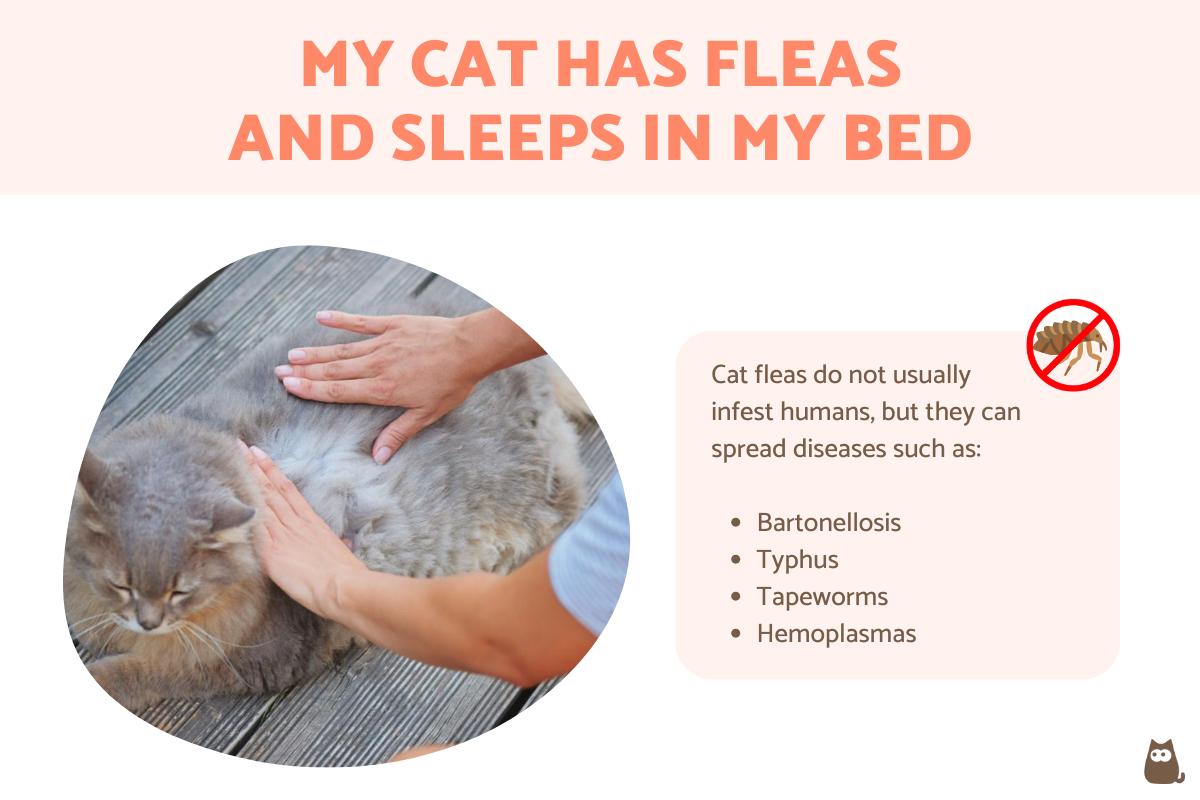My Cat Has Fleas and Sleeps in My Bed



See files for Cats
When a cat has fleas, letting them sleep in our bed is a mistake. Fleas are ectoparasites of cats and can cause them great discomfort. They feed on the blood of the cat, biting their skin to do so. This results in an inflammatory response, something which is greatly exacerbated the more fleas there are on their body. Moreover, fleas are vectors of various diseases which can seriously threaten the feline's health and well-being. These include bacterial diseases and even tapeworms. Cat fleas cannot infest humans in the same way as we are not hosts for their species. This may lead some of us to ask should i let my cat with fleas sleep on my bed?
At AnimalWised, we discover what happens when my cat has fleas and sleeps in my bed. We discover why this is something we should not let happen and why it is so important to eliminate a flea infestation immediately. This is for both the benefit of ourselves and our cat.
Can my cat give me fleas?
A flea infestation occurs when certain species of fleas attach themselves to the skin and hairs of a cat's body. As they are ectoparasites, they use the feline as a host for sustenance in the form of blood. They bite the skin of the cat and cause irritation and they pose a serious risk of spreading various diseases. The main species of fleas which infest cats are:
- Cat flea (Ctenocephalides felis)
- Dog flea (Ctenocephalides canis)
Although these species from the genus Ctenocephalides are associated with these two animals separately, they can infest dogs and cats similarly. However, they are not known to infest humans. For this reason, it is not likely you will have an infestation of fleas on your body. This does not mean they won't cause you harm.
Cat fleas will aim for their feline host, but if a cat with fleas sleeps in your bed, it means the insects can remain in the environment when the cat is not there. If we go into the bed, the fleas are likely to bite us. While they will likely not cause an infestation, they can still bite us as a temporary food stuff. They can also lay eggs which will further spread the flea infestation in the home. If we get flea bites, it is possible they will act as vectors of zoonotic disease.
Fleas reside on the body of cats because they have all the qualities and needs that they require to grow and develop correctly. They can live up to 2 years in the body of a cat. Since the fleas will continue their life cycle by producing new eggs, a cat flea infestation can be indefinite. Outside of a feline host they, could live for about 6 months feeding on human blood or in other conditions.
The problems these cause for the cat are not only limited to discomfort. The diseases they spread can seriously harm their well-being. They also can cause the cat's immune system to become weakened and make them vulnerable to other conditions. Even if you do not see the fleas themselves, you will see the cat's coat looks rough as it is in poor condition. This is due to overall poor health as a result of these parasites.
While fleas are ectoparasites in cats, they can be infested by various species. Learn more with our article on the types of intestinal parasites in cats.
What happens if my cat has fleas and sleeps in my bed?
As we have explained, the vast majority of cat fleas cannot infest humans. However, they can cause problems due to biting and the potential spread of disease. The following diseases are spread by fleas on cats:
- Bartonellosis: also known as cat scratch disease, this is a disease caused by the bacterium Bartonella henselae. It causes swollen lymph nodes due to the attack on the immune system, making them vulnerable to other diseases. This disease can be transmitted to humans through flea feces, often via a scratch or bite from the cat.
- Flea-borne typhus: this is another bacterial infection, this time caused by the bacteria Rickettsia typhi and Rickettsia felis. It can cause muscles pain, fever, vomiting and often results in a rash developing. It can be transmitted through flea bites or contact with flea feces.
- Tapeworms: although fleas are ectoparasites, they can transmit endoparasites (internal parasites) through their bite. Tapeworms such as Dipylidium caninum can pass from the mouth of the flea into the bloodstream of the animal. Although it is rare, it can also be transmitted to humans when they accidentally ingest flea feces, particularly children. This can occur when sleeping in the same bed as a cat with fleas.
- Hemoplasmas: these are small epicellular parasites which include the bacterium Mycoplasma haemofelis. They can result in feline infectious anemia.
These diseases are the main health risk since they can seriously threaten both the feline and the human organism. However, the flea bites themselves can be very irritating and result in secondary bacterial infections. The discomfort and pain caused by fleas from a cat sleeping in your bed can be seriously unhygienic and detrimental to your health.
Although dog and cat fleas do not use humans as a host, there are rare types of fleas which can infection both humans and these companion animals. The species known as the human flea (Pulex irritans) and the tropical rat flea (Xenopsylla cheopis) can also infest humans. We should never let a cat with fleas sleep in our bed.

What do I do if my cat has fleas and sleeps with me?
Once you have determined a cat has fleas and is sleeping in your bed, you will need to take immediate action. You will need to not only eliminate the fleas from the cat, but also from the environment. Doing so prevents reinfestation and safeguards both the animals and people in the home. Below are some actions you should take if a cat with fleas has been sleeping in your bed:
- Deworm the cat: this is especially important in warm climates when it is more common to encounter these parasites. However, regular deworming is required for all cats throughout the year. The moment you realize your feline has fleas, go to the veterinarian so they can carry out an examination and determine which parasitic agent is necessary for your cat. They will also be able to establish a deworming schedule to ensure this does not happen again in the future. If we do not do this, the fleas will remain in the environment and cause problems again.
- Disinfect the places where your cat has been: especially the bed where you sleep. This will prevent fleas from biting you. You should wash your bedsheets at 60ºC/140ºF. Do the same to the cat's bed, blanket or any fabric on which they rest. You can add a little bleach to the wash to enhance the effect.
- Vacuum your mattress and your entire house: this is to ensure all adult fleas, larvae or eggs are removed and further infestation is prevented. Not all surfaces can be washed or vacuumed, but they all need to be cleaned appropriately.
- Use flea sprays: these are special solutions which are designed to be sprayed in the environment as an insecticide. They should kill eggs, larvae and adult fleas.
- Baking soda and salt: this can be an effective home remedy in cleaning the environment, although it will not act as a repellant nor will it kill the fleas directly. It is useful aid to cleaning affected surfaces, especially carpets.
In addition to flea-borne diseases, there are other zoonoses that can be spread by felines. Learn more with our article on stray cat diseases transmissible to humans.
This article is purely informative. AnimalWised does not have the authority to prescribe any veterinary treatment or create a diagnosis. We invite you to take your pet to the veterinarian if they are suffering from any condition or pain.
If you want to read similar articles to My Cat Has Fleas and Sleeps in My Bed, we recommend you visit our De-worming category.





